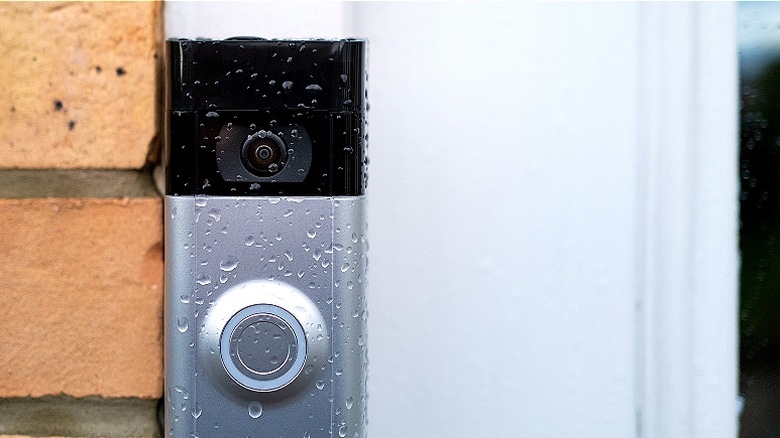Scam Warning: Never Fall For These Door-To-Door Sales Scam Tactics
In the age of doorbell cameras, long work hours requiring in-office time, and younger generations less likely to answer the door, it's almost anachronistic to think that door-to-door sales scams are still a thing in 2024. Yet, states are still putting out notices to keep consumers alerted to potential door-to-door sales scams. The more things change, the more they stay the same.
The elderly are often thought to be the prime target for most financial scams, and the door-to-door sales scam is no different. According to a 2024 YouGov survey, 59% of seniors will answer a knock at the door. However, one-third of all Americans polled (across generations) said a stranger's knock would at least pique their curiosity. This proves that people of any age can be targets. If curiosity killed the cat, answering the doorbell might ding the delulu.
But as long as there are doors, there will be door-to-door salespeople ... and door-to-door scam artists. So what are the new scam tactics on the block today? And what are some ways to avoid these new criminals and their old tricks?
Common door-to-door sales scams and their goals
When it comes to the door-to-door scam, beware of people pretending to be official when they're only officially up to no good. For example, people may pose as employees from local government agencies or service providers in order to seem legitimate and gain access to your funds, or home (see about the latest housing scams sweeping the industry, too). Fraudsters pretending to be EPA agents doing routine investigations of properties, utility workers checking meters, and energy or security providers are all of concern.
These pretend-officials may prove a step up in sophistication from more commonly thought-of door- to-door sales scams, like the imposter asphalt paver or con people posing as home repair contractors. Fake paperwork, logos, and/or uniforms may lend scammers an air of legitimacy to gain their targets' trust. Once gained, fraudulent salespeople may use their target's distress or attention as a way to case that target's home for future theft — or swindle money and data out of a target by coercing a deposit or contract signature on the spot.
Even "legitimate" businesses can engage in scammy intimidation tactics after you answer the door. Have you ever felt pressured to let a local business mow your lawn, for example? Or buy cookies or some other fundraising product? Sometimes, the only difference between a scam and extortion is the amount of menace behind a smile. Whether scam artists are pretending to be solar-energy installers, water-filtration reps, or are just extremely intimidating but otherwise "legitimate" service providers, their common goal is to part you from your money, without giving you much choice in the matter.
How to avoid scam artistry
So ... how to avoid scams without cultivating an unhealthy distrust of friends, neighbors, and the neighborhood kid looking to mow a lawn or two? While hiding from the world may help keep trouble at bay, it is an isolating protection tactic. It may serve potential targets better to remember that teamwork, haste, and intimidation are tools of the scam-artist trade.
If a pair of real fast-talkers ring your door's bell, it could be a sign that they're trying to overwhelm you with information. While one keeps you talking, the other may be checking out what goodies you have in your hallway. If you get the sense that you're being scammed, don't be afraid of just shutting the door. You can also speak to your visitors through the door. Ask them to leave a card so you can research their company. This is good practice in any scenario where you would be selecting a vendor, let alone one that came looking for you.
Think of the vetting you would do to avoid a Facebook Marketplace scam or protect yourself from getting tricked by scammers over the phone. Don't sign anything on the spot, and know the fine print on contracts before you agree to a bad deal. If you ever feel like you're being impolite for saying "no" or that you need time to research more, just remember the Wet Bandits from "Home Alone." They seemed like just a couple of friendly guys at first, too.


